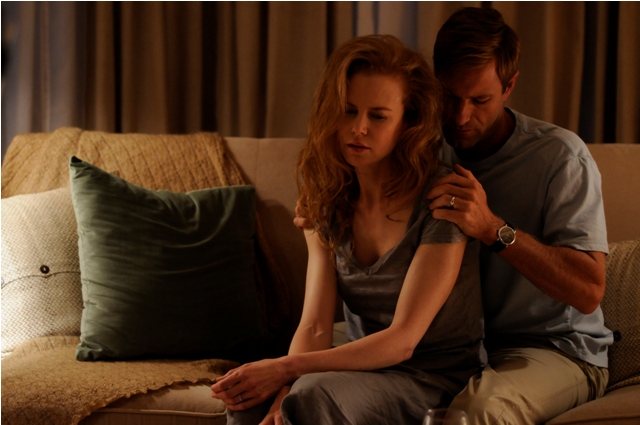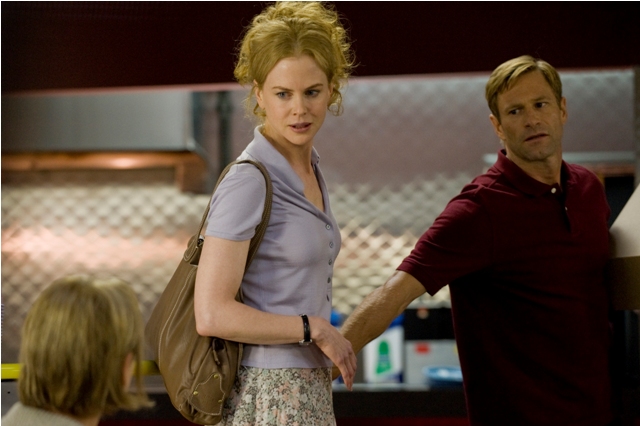CHICAGO – Patrick McDonald of HollywoodChicago.com appears on “The Morning Mess” with Dan Baker on WBGR-FM (Monroe, Wisconsin) on March 21st, 2024, reviewing the new streaming series “Manhunt” – based on the bestseller by James L. Swanson – currently streaming on Apple TV+.
Nicole Kidman, Aaron Eckhart Avoid Melodrama in Moving ‘Rabbit Hole’
 Rating: 4.5/5.0 |
CHICAGO – John Cameron Mitchell’s “Rabbit Hole” tells a story not uncommon to cinema in its exploration of the emotional minefield that comes after the loss of a child but it does so with such restraint and humanity that it sets itself apart. With some of the best performances of the year from Nicole Kidman, Aaron Eckhart, and Dianne Wiest, this is one of the strongest dramas of the awards season.
Melodramatic writers and directors have often used the death of a son to manipulate audiences with clichéd tearjerkers but honestly portraying such raw emotions is much more difficult. David Lindsay-Abaire’s excellent script for “Rabbit Hole” doesn’t focus on the death or even the days shortly thereafter, instead turning to how a couple heals months later, after the emotional scabs have formed. With arguably career-best turns from Kidman and Eckhart along with a subtlety rarely found in films like this, “Rabbit Hole” is sometimes mesmerizing and respectably low-key. I wished for one more revelation, moment, or scene that would push the film from great to perfect but it’s almost there.

Rabbit Hole
Photo credit: Lionsgate
Becca (Nicole Kidman) and Howie (Aaron Eckhart) have been completely devastated by a loss that (I hope) you couldn’t possibly understand. There’s no road map for how to behave months after your son has died. There are support groups, but Lindsay-Abaire’s script is arguably at its most-fascinating when it asks the relatively-mundane questions like when do you give the clothes away? Do you sell the house in which he grew up? How long do you go to therapy? What if you’re not getting anything out of it anymore?
The divide between Becca and Howie has clearly been growing for some time – he stays up watching videos of his son while she feels pain every time she’s reminded of him – but it really kicks in when she stops going to group therapy. Howie continues to go and gets closer to one of the women there (Sandra Oh) while Becca actually begins something close to friendship with the young man (a startlingly-effective debut from Miles Teller) responsible for her son’s death.
Meanwhile, Becca faces drama with her mother (an amazing Dianne Wiest) and sister (Tammy Blanchard), two women similarly unsure how to approach the greatest tragedy of their lives. Becca’s mother also lost a son, Becca’s brother, and wants so desperately to emotionally connect with the commonality she shares with her daughter but the difference between losing an adult son and a child one arguably pushes them even further apart.

Rabbit Hole
Photo credit: Lionsgate
Nearly every scene in “Rabbit Hole” features a moment – a bit of work by Mitchell or one of his cast members – that could turn manipulative or melodramatic but does not. A woman sitting on a bench listening to the boy responsible for her son’s death could have SO easily turned into a soap opera but it never does. Kidman won’t allow it. She’s perfectly cast as a woman who has buried her pain, and in doing so has stopped listening to that of her husband or her mother. Becca has even turned on the family dog. She has chosen to navigate the emotional minefield by wearing as much armor as possible but it’s closed her off to the people who need her and whom she needs.
Mitchell proved he was a filmmaker to watch with the excellent “Hedwig and the Angry Inch,” a film that couldn’t be more dissimilar to “Rabbit Hole” except for the fact that both works defy expectation of their genre. Just as “Hedwig” wasn’t a typical musical, “Rabbit Hole” is far from a typical drama. Still, it’s how Mitchell avoids the traps of his genre that make it such an accomplished work. Particularly, I loved the stability of his camerawork. There are many shots that are static, especially the ones in the park, and it adds realism, a fly-on-the-wall quality, that truly enhances the piece.
Ultimately, “Rabbit Hole” is a performance piece. Eckhart continues to make the case that he’s one of the most underrated actors of his generation while Kidman returns from a bit of a lull to stake her claim to the same title. Even if you look forward to this time of year for the strength of awards-bait performances that hit arthouses and even the multiplex, you will still be blown away by “Rabbit Hole.”
 | By BRIAN TALLERICO |


